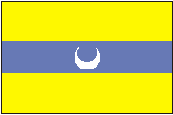
NUHU KIWANGAR

| Area - 3,573 km˛
Population - 2,510,000 inhabitants (2015) Density - 702 inhab./km˛ Major Cities - Purikali, 1,320,000; Bandajaya, 290,000; Masar, 170,000; Kautaira, 102,000; Ratangiti, 92,000; Karwauyuni, 82,000; Tanuwari, 61,000; Masidi, 51,000; Beramar, 41,000; e Rataanga, 31,0000. Dialects - Kauta Kiwangar (Purikali and south Kiwangar), 1,899,000; Haiimarata (inland), 433,000 and Taumelan (north and northeast coast), 178,000. Religions - Christians (Kauta), Muslims (Aimarata and Taumelan), Buddhists (Chinese descendants). GDP per Capita - KAH 42,269.00 yearly - KAH 46,944.00 in Purikali (2015) |
Participation in the national GDP - 64% (Purikali 37.5%) Industry - electronic devices; manufactured and computer products; naval; auto equipments and vehicles, textiles; food. Agriculture - rice, spices, coffee, coconut, fruits and sago; fowl, goat, pork, and beef/buffalo. Climate - Equatorial (monsoon); average temperature in the rainy season, 27ēC. In the dry season, 25ēC and in the lake region, 22ēC. Rain: 2,350 mm yearly. Waters - Rivers: Mambaki, Hubi, Puramada, Lau, Yembela, Bidi, Riberaung, and Malin. Lake: Gajawatu Major Peak - Rata Gajawatu, 1,232 m. Name origin - Kiwangar derives from "kuuru kiuankar" that means, in aboriginal language, " island of fishermen". |